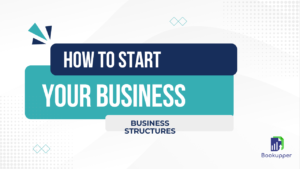
When you first start a business, one of your top concerns should be how to minimize your personal liability. That means that you choose a business structure that separates you as an individual—along with all your personal assets—from the business as an entity. Here, we look at the three most common business structures, and what you need to know about each.
Sole Proprietorship
By default, you start your business as a sole proprietor unless you file paperwork to choose a different business structure. By doing nothing in terms of choosing one, you’re automatically a sole proprietor.
Under the sole proprietorship structure, there is no legal difference between you as an individual and your business. All your business’ assets and liabilities exist under your own name, even if you operate the business under a different name by filing fictitious business name (i.e. DBA, “Doing Business As,” etc.).
If you plan to take out a business loan, understand that your approval will be based on your personal credit history and assets, as well as your risk profile. And you will be responsible for paying off the loan, even if your business can’t afford to. Taxes for a sole proprietorship will be reported on your personal income tax, and you won’t be able to take advantage of some of the tax incentives offered by other business structures.
If your business is ever sued, your personal assets will be at risk. This includes your house, property and savings. For this very reason, a sole proprietorship is considered a risky business structure to operate under.
Note: A general partnership shares most of the same qualities as a sole proprietorship, except it has two or more owners.
Corporation
A corporation, on the other hand, is a legally separate entity from you as the business owner. It is responsible for all of its own debts and liabilities, and your personal assets can never be touched to cover business obligations. This “corporate shield” protects your personal assets from being taken on behalf of the business.
Once you register your business as a corporation, you are required to set up a formal structure consisting of shareholders, directors and officers, all of whom need to be recorded in your official corporation paperwork.
- Shareholders, who may be owners, receive a portion of the company’s equity
- Directors make strategic decisions through the Board of Directors
- Officers manage the day-to-day activities of the company
If you plan to seek funding from venture capitalists, the corporation is the preferred business structure. Because your corporation is considered a separate entity from you, it will need a separate tax return.
Many small businesses opt for the S Corporation, which does not file its own taxes. Instead, company profits are “passed through” and reported on your personal income tax return, as well as that of other shareholders. As an S Corporation owner, you are taxed on your respective shares of the company’s profits (and these profits are not subject to self-employment tax). You can also pay yourself a salary as an employee of the S corp.
Another type of corporation is the C Corporation. C corps offer limited liability protection, but come with the added perk of being able to sell more than 100 shares of company stock. The main drawback is tax-related. Any profit made by a C corp is taxed twice. Upon realizing the profit, a C corp must pay taxes on it. When those profits are passed onto shareholders, the shareholders must pay an income tax on those same profits.
Limited Liability Company (LLC)
If you’re looking for something in between a sole proprietorship and corporation, consider a limited liability company (LLC). In an LLC, your personal liability is limited, just like it is in a corporation, but there is less formality and paperwork than a corporation requires.
With an LLC, you have flexibility in how you will be taxed. For example, you can structure your LLC to be taxed as a C Corporation or more commonly as an S Corporation (where the business doesn’t file its own taxes).
Weigh each business structure carefully before choosing the one under which you will operate.
📈 Ready to Build a Strong Foundation for Your Business? 📚
At Bookupper, we know that the right business structure can make all the difference in your success journey. Whether you’re just starting out or looking to optimize your existing setup, understanding your options and choosing the best structure is crucial for growth, tax efficiency, and long-term sustainability. 🌟
Let’s build your success together, one smart choice at a time! 💪
📞 Call us at (860) 263-9170
📧 Email us at contact@bookupper.com
🌐 Visit us at https://bookupper.com/
